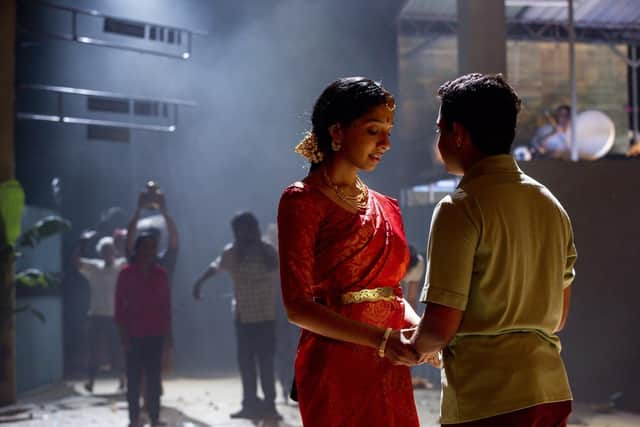Edinburgh International Festival theatre and music reviews: Counting And Cracking | Royal Scottish National Orchestra, Elim Chan and Lukáš Vondráček | Anne Sofie von Otter
THEATRE
Counting And Cracking ****
Lyceum Theatre, Edinburgh
Three years ago, the Edinburgh International Festival played host to Sidney Theatre Company’s Secret River, an unforgettable story of the founding of modern Australia – and of Sydney in particular – on the desperation of poor and criminalised white people from Britain, who grasped at their only chance of acquiring some land and status, at a bitter cost to the first nation people of Australia.
And now – once again out of that mighty southern city – comes another vital tale for our times, in S. Shakthidharan’s Counting And Cracking, produced by Sydney’s Belvoir Theatre, and featuring a multilingual cast of nineteen from six nations. Like Secret River, Counting And Cracking is a tale of the legacy of colonialism, as our hero Sid (short for Siddhartha) gradually learns how his Tamil family was forced to leave their native Sri Lanka in the1980’s, exiled by a rising tide of militant Sinhalese nationalism.
Advertisement
Hide AdAustralia is famous, of course, for its popular dramas and family sagas, usually seen on television; but there can rarely have been an Australian family story told with such purpose and passion, as the narrative ranges over the years between 1956 – when Sid’s mother Radha was born into a leading Tamil family in Colombo – to 2004, when an unexpected phone call turns her new Australian life upside down, and sends Sid on his quest to know more.
Exquisitely played by Nadie Kammallaweera and (when younger) Vaishnavi Suryaprakash, Radha is the pivotal figure in this gently-paced but ever more absorbing story about the human cost of the kind of third-rate politics that seeks to exploit and deepen ethnic divides, as she gradually drops the rigid defences she has had to raise against the pain of the past, and begins to tell her story in full. And she is only one of a vast gallery of vivid and memorable characters, in a touching and gorgeously-staged tale of how the liberal Sri Lankan vision of Radha’s politician grandfather was brutally destroyed; only to be reborn – tentatively, but hopefully – in a new country, far away. Joyce McMillan


Until 14 August, www.eif.co.uk then at Birmingham Rep, 19-27 August, www.birmingham-rep.co.uk/whats-on/counting-and-cracking/
MUSIC
Royal Scottish National Orchestra, Elim Chan and Lukáš Vondráček ****
Usher Hall, Edinburgh
Maybe it was the original all-20th and 21st-century programme that put punters off. Whatever the reason, it was pretty dispiriting to see only a fraction of the number of people in the Usher Hall that the RSNO would get for a season concert. And ironic, too, since with percussionist Martin Grubinger indisposed, a last-minute programme change had made it a far more crowd-pleasing evening.
Conductor Elim Chan was clearly determined to make her mark, whatever the repertoire, and however many in the audience. She pranced nimbly through the new opener – Dukas’s Sorcerer’s Apprentice – flicking her wrists to cue sections and individuals, and the RSNO responded with brilliant, flickering colours and larger-than-life theatrics. There was a bit of a see-you-at-the-other-end energy between Chan and soloist Lukáš Vondráček before the no doubt hastily prepared replacement concerto, Liszt’s Piano Concerto No. 1 – but Vondráček gave a barnstorming performance, thunderous and exquisitely poetic by turns, fiercely compelling, and ably supported by the RSNO musicians.
Advertisement
Hide AdIf there was one weak point, it was that Chan’s abundant enthusiasm discouraged her from dwelling deeply in the darker passages of Bartók’s Concerto for Orchestra – but even so, her account was a muscular, energetic, superbly shaped. Any absent listeners didn’t know what they were missing. David Kettle
MUSIC
Anne Sofie von Otter ***
Queen’s Hall, Edinburgh
As a concept, the programme structure of yesterday morning’s Queen’s Hall concert was neatly inventive. Rather endearing sets of songs by Rufus Wainwright framed four songs by Schubert, interspersed by each of the four movements of his string quartet, Death and the Maiden. How well this worked artistically is questionable, but what did come through in Swedish mezzo-soprano Anne Sofie von Otter’s performance was the art of story-telling, whether Wainwright’s observation on press critics who didn’t write favourably about his first opera, or Schubert’s melancholic depiction of loneliness, Einsamkeit, from his song-cycle Winterreise.
Advertisement
Hide AdIt's unusual for a 67-year old classically trained singer – even one as glamorous as Anne Sofie von Otter – to appear in recital on an international festival platform. Perhaps unsurprisingly for an artist who is known for moving flexibly across genres, it was the easy style of the Rufus Wainwright songs, with gentle accompaniment from pianist Christoph Berner, which best brought out her mature, assured performing personality.
In an unexplained change of artist from the cutting-edge Brooklyn Rider string quartet, Quatuor van Kuijk approached Schubert’s Death and the Maiden with lyrical vigour but not always the finesse to allow clarity of detail. Carol Main